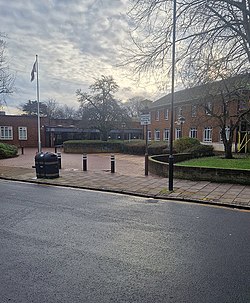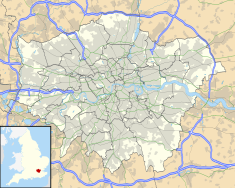| Isleworth Crown Court | |
|---|---|
 Isleworth Crown Court Isleworth Crown Court | |
| Location | Ridgeway Road, Isleworth, Greater London |
| Coordinates | 51°28′45″N 0°20′24″W / 51.4791°N 0.3400°W / 51.4791; -0.3400 |
| Built | 1949 |
| Architectural style(s) | Neo-Georgian style |
 | |
Isleworth Crown Court is a Crown Court centre which deals with criminal cases at 36 Ridgeway Road, Isleworth, London.
History
The site was originally occupied by three large manor houses. However, following the Second World War, the Ministry of Pensions and National Insurance acquired the site and demolished the houses with the intention of commissioning a hostel for paraplegics on the site. The main administration block was designed in the Neo-Georgian style, built in red brick and was officially opened as "Duchess of Gloucester House" by Princess Alice, Duchess of Gloucester in November 1949. The design involved a symmetrical main frontage of seven bays facing onto Ridgeway Road. The central bay featured a stone panel engraved with the Royal cypher of King George VI. The building was fenestrated with tripartite casement windows on the ground floor and bi-partite casement windows on the first floor. In the late 1970s, the UK Government decided that such specialist support was no longer required, the residents were re-housed and the hostel was closed.
Until the 1980s, the principal criminal court for north London was the Middlesex Guildhall in Parliament Square. However, as the number of criminal cases in north London grew, it became necessary to commission a dedicated courthouse for west London. The former hostel was then transferred to the ownership of the Lord Chancellor's Department and converted into a courthouse at a cost of £4.4 million. In December 2006, the department secured planning consent for an extension large enough to accommodate six extra courtrooms. The extension was built by Geoffrey Osborne and was opened in December 2009.
Notable cases heard at the court have included the trial and conviction, in 2011, of 24 members a notorious English football hooligan firm known as the Chelsea Headhunters, who were accused of taking part in violence, which resulted in several people being injured, including a police officer whose jaw was broken. Cases also included the trial and acquittal, in 2013, of sisters, Elisabetta and Francesca Grillo, former personal assistants to Nigella Lawson and her ex-husband Charles Saatchi, who were accused of using their credit cards, specifically without special authorisation, on the account of Saatchi's private company.
Judges
- Suzanne Norwood, resident from 1986
References
- "Isleworth Crown Court". Gov.UK. Retrieved 12 October 2015.
- ^ "Duchess of Gloucester House". Lost Hospitals of London. Retrieved 14 January 2023.
- "A visit to Britain's newest and highest court – the Supreme Court". The Kensington Society. 9 May 2019. Retrieved 19 August 2019.
- "Capital Building Programme". Hansard. 26 January 1996. Retrieved 12 March 2023.
- Bowlt, Eileen M. (2007). Justice in Middlesex: A Brief History of the Uxbridge Magistrates' Court. Waterside Press. p. 85. ISBN 978-1906534448.
- "House of Lords: Examination of Witnesses". UK Parliament. 9 November 2005. Retrieved 14 January 2023.
- "Move to make way for supreme court hits planning snag". Law Society Gazette. 1 December 2006. Retrieved 14 January 2023.
- "House of Lords". Hansard. 14 June 2007. Retrieved 14 January 2023.
- "Green Travel Plan: Isleworth Crown Court". What do they know. 5 December 2009. Retrieved 14 January 2023.
- "Chelsea violence: Men sentenced following Cardiff match". BBC News. 25 March 2011. Retrieved 14 January 2023.
- "Three Wandsworth men sentenced for their part in football violence". Sutton and Croydon Guardian. 27 March 2011. Retrieved 14 January 2023.
- "Lawson and Saatchi assistants found not guilty of fraud". The Guardian. 20 December 2013. Retrieved 14 January 2023.
- "Two PAs cleared of fraud - and Nigella Lawson left reeling at 'ridiculous sideshow' of drug allegations and public dissection of her marriage to Charles Saatchi". The Independent. 20 December 2013. Retrieved 14 January 2023.
- "Her Honour Suzanne Norwood", The Times, p. 74, 25 May 2024